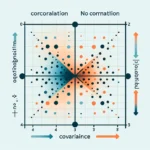Covariance in Cognitive Testing: Understanding the Relationship Between Variables
Covariance is a statistical measure that is crucial in the field of cognitive testing. It evaluates the extent to which two variables change together, which in the context of cognitive assessments, provides insights into how different cognitive abilities may be interrelated. By calculating the covariance between test scores or subtest results, researchers and clinicians can discern patterns and connections that might not be apparent upon casual observation.
Covariance is calculated by taking the sum of the product of the deviations of each pair of scores from their respective means, divided by the sample size minus one. A positive covariance indicates that as one variable increases, the other variable tends to increase as well. Conversely, a negative covariance suggests that as one variable increases, the other decreases. A covariance close to zero implies no observable linear relationship between the variables.
Cognitive tests often measure various abilities such as memory, attention, language, and executive functions. Understanding the covariance between these test components can offer valuable information about an individual’s cognitive profile. For example, if a high positive covariance is found between verbal memory and language abilities, it may suggest that interventions targeting language could also benefit memory performance.
In the realm of cognitive psychology, covariance allows for the exploration of the construct validity of different cognitive tests. If two tests that purportedly measure the same underlying cognitive construct show high positive covariance, it provides evidence that they may indeed be assessing similar cognitive dimensions.
Furthermore, covariance analysis is instrumental in the development of cognitive models and understanding cognitive aging or the impact of neurological disorders on cognitive function. By examining the covariation patterns of cognitive abilities under different conditions or across different populations, researchers can fine-tune psychological theories and tailor rehabilitation approaches.
In summary, covariance is a powerful tool in cognitive testing that sheds light on the relationships between cognitive processes. It assists in validating cognitive tests, informing the creation of multifaceted treatment plans, and enhancing the precision of cognitive research. Understanding covariance paves the way for more integrated and individualized approaches to cognitive assessment and intervention.

